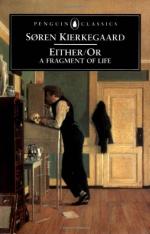
|
| Name: _________________________ | Period: ___________________ |
This test consists of 15 multiple choice questions and 5 short answer questions.
Multiple Choice Questions
1. What does the author say the young man he is writing to wants to be?
(a) A pig.
(b) Fate.
(c) An archangel.
(d) A priest.
2. How does the author say he must always be with the young man?
(a) Cautious.
(b) Frivolous.
(c) Gentle.
(d) Firm.
3. What is the reader to understand about the content of Kierkegaard's letter?
(a) The reader is to understand that the contents of the letter apply to King David.
(b) The reader is to understand that the contents of the letter apply to Kierkegaard's wife.
(c) The reader is to understand that the contents of the letter apply to the prophet Nathan.
(d) The reader is to understand that the contents of the letter apply to the reader himself and not to another.
4. What does the author say first love is for him?
(a) A bad word.
(b) A catch phrase.
(c) A good word.
(d) A password.
5. What is the opening phrase of the work?
(a) "Ladies and Gentlemen,".
(b) "Hey, guy,".
(c) "Dear Friend,".
(d) "Red Fox to Chrome Eagle:".
6. What is the relationship between marriage and first love according to the author?
(a) Marriage is the equivalent of first love.
(b) There is no relationship between marriage and first love according to the author.
(c) Marriage is the transfiguration of first love.
(d) Marriage is the annihilation of first love.
7. To what does the author of the letter compare the young man at the end of this section?
(a) The author compares the young man to the pilot of a ship.
(b) The author compares the young man to a bull rider.
(c) The author compares the young man to a blushing bride.
(d) The author compares the young man to an actor.
8. What character in opera does the author say embodies the state preceding love?
(a) Tristan in TRISTAN AND ISOLDE.
(b) Don Giovanni in DON GIOVANNI.
(c) Wotan in THE RING CYCLE.
(d) Page in FIGARO.
9. Between what two types of doubt does the author say it is important to distinguish?
(a) Personal and scientific doubt.
(b) Religious and erotic doubt.
(c) Temporal and eternal doubt.
(d) No doubt and full doubt.
10. What creature sends the author into "reverie"?
(a) The tiger.
(b) The jellyfish.
(c) The elephant.
(d) The catfish.
11. To what does the author compare the engagement period?
(a) Being held underwater, dying for a gasp of fresh air.
(b) Being tortured on the rack.
(c) The time it takes many people to dive into the water when they go swimming.
(d) The time one spends at the hair salon.
12. What does the author believe accounts for the young man's excessive anxiety?
(a) The author believes the young man is afraid of his father.
(b) The author believes the young man is afraid of missing the erotic moment.
(c) The author believes the young man is afraid of death.
(d) The author believes the young man is afraid of missing all the frivolity of the engagement period.
13. How does marital love manifest itself as historical?
(a) By being a process of history.
(b) By being a process of assimilation.
(c) By being a process of destroying.
(d) By being a process of dominating.
14. What does the author say is the most intensive enjoyment?
(a) Drug taking.
(b) Dreaming as if you would live forever.
(c) Clutching the enjoyment in the consciousness that it may vanish in the next moment.
(d) Sexual intercourse.
15. Who is the only one who has a true conception of who he is according to the author?
(a) The man who is self-sufficient.
(b) The man who loves.
(c) The man who can fight.
(d) The man who meditates on mountain tops.
Short Answer Questions
1. What quality does the author say love shares with everything eternal?
2. The author asserts that just as nothing is impossible for God, nothing is impossible for whom?
3. What does the author say can crush the aesthetic in a human being?
4. In addition to having a priority in itself, what other quality does marital love possess according to the author?
5. What does the author say that the first love always is?
|
This section contains 690 words (approx. 3 pages at 300 words per page) |

|




